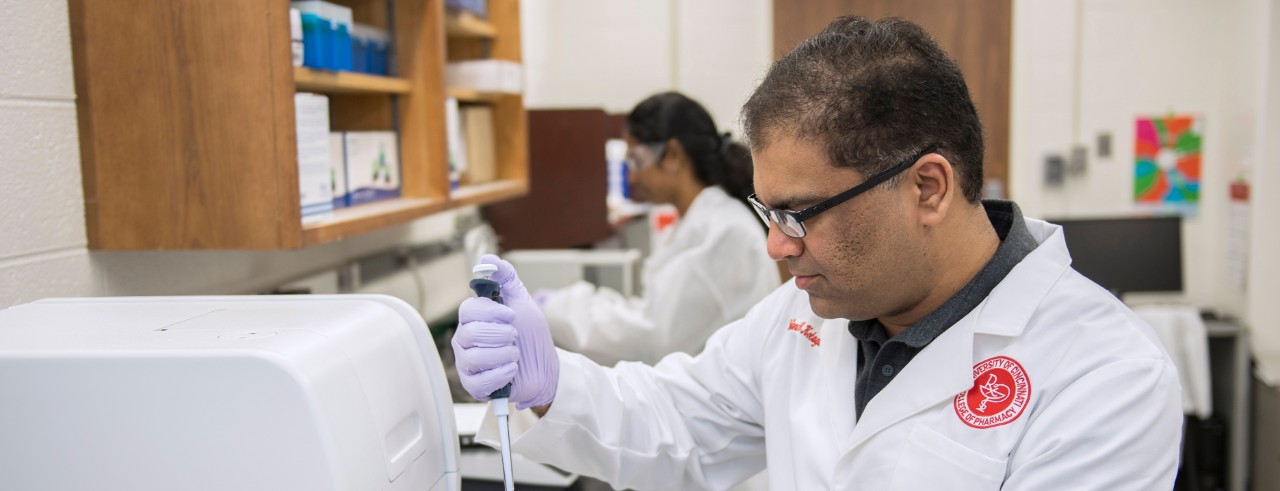
UC research studies new technique to visualize CAR T-cells in body
Cancer Center researcher receives $2.3 million NCI grant
A new University of Cincinnati Cancer Center study funded by a $2.3 million National Cancer Institute grant aims to develop a new technique to visualize where genetically modified immune cells go in the body after being administered to patients with cancer.
Study background
During CAR T-cell therapy, physicians collect patients’ own immune cells, genetically engineer them to express chimeric antigen receptors (CARs) and then inject them back into the patient to target cancer cells. CAR T-cell therapy has revolutionized treatment for some liquid tumors like lymphoma and leukemia, but it has not been as successful as a treatment for solid tumors.
UC’s Nalinikanth Kotagiri, PhD, a researcher at UC’s James L. Winkle College of Pharmacy and a member of the University of Cincinnati Cancer Center, said there is a need for better tracking methods.
“Currently we lack a reliable way to track CAR T-cells in the body post-infusion, especially in patients with solid tumors,” Kotagiri said. “In cases where therapy does not succeed, we cannot confirm if the cells even reached the tumor or were able to persist in those regions.”
Study details

Nalinikanth Kotagiri, PhD. Photo/Colleen Kelley/UC Marketing + Brand
In order to visualize the immune cells, Kotagiri and his colleagues are adapting a technique he previously developed to image specific pathogens in the lungs. This approach uses specialized contrast agents that bind selectively to bacterial receptors, which then “light up” during PET scans.
For this study, the team genetically engineers CAR T-cells to express these same bacterial receptors, enabling the cells to take up the contrast agents and become visible on PET scans.
With this method, researchers will gain insight into the location and persistence of CAR T-cells in real-time within the body. Since CAR T-cells divide and produce new cells over time, this technique may allow the tracking of cell lineage, providing valuable data on the behavior of the modified cells long after injection.
The NCI grant funding will allow Kotagiri and his team to continue research using this technique in animal models and human solid tumor samples.
CAR T-cell therapy is already an example of personalized medicine, since it uses patients’ own cells, but Kotagiri said the additional knowledge of where the cells go in the body could provide even more personalized treatment options. By identifying where CAR T-cells go and how long they persist, this method could lead to more tailored and responsive treatment regimens, helping clinicians optimize CAR T-cell therapy based on precise cellular behavior.
“By tracking CAR T-cells in real time, we gain personalized insights that could inform adjustments in therapy, such as dosing frequency or cell engineering strategies, offering a unique ‘journey into the body’ of each patient’s treatment response,” Kotagiri said.
Stay connected with the Cancer Center
Interested in learning more about the University of Cincinnati Cancer Center? Keep up to date by signing up for communications and newsletters based on your specific interests. Sign up for Cancer Center communications.
Featured image at top of Nalinikanth Kotagiri working in the lab. Photo/Colleen Kelley/UC Marketing + Brand.
Other collaborators on the project include Yueh-Chiang Hu, PhD, director of Cincinnati Children’s Hospital’s Transgenic Animal and Genome Editing Core and associate professor in UC’s Department of Pediatrics, Pankaj Desai, PhD, professor and chair of the Pharmaceutical Sciences Division and director of the drug development graduate program in the College of Pharmacy, Ed Faber, DO, associate professor of internal medicine in UC’s College of Medicine and a UC Health physician, Mathieu Sertorio, PhD, research assistant professor in the College of Medicine, and Changchun Xie, PhD, professor of biostatistics in the College of Medicine.
Research reported in this publication was supported by the National Cancer Institute of the National Institutes of Health under Award Number 1R01CA279962-01A1. The content is solely the responsibility of the authors and does not necessarily represent the official views of the National Institutes of Health.
Related Stories
UC research studies new technique to visualize CAR T-cells in body
November 15, 2024
A $2.3 million National Cancer Institute grant will fund a University of Cincinnati Cancer Center study to develop a new technique to visualize where genetically modified immune cells go in the body after being administered to patients with cancer.
Onconephrology provides focused kidney care for patients with cancer
July 31, 2024
The University of Cincinnati's Prakash Gudsoorkar is advancing the field of onconephrology, which is focused on the impact of cancer and its treatment on kidney health.
Cancer Center researcher studies combination therapy to improve leukemia treatment
September 6, 2024
The University of Cincinnati Cancer Center’s Eric Vick, MD, PhD, has been awarded a nearly $215,000 grant from the Leukemia and Lymphoma Society (LLS) and a $50,000 American Society of Clinical Oncology (ASCO) Young Investigator Award to continue research into a combination therapy treatment for acute myeloid leukemia (AML).
